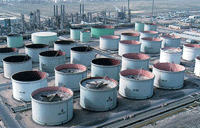
President Evo Morales "nationalized" the country's crucial natural gas industry last year by forcing foreign companies to accept new contracts and pay sharply higher taxes.
The industry has gone along without public protest, but it has made a statement with dwindling exploration budgets.
Now it appears the Bolivian government has a problem: It has orders for more natural gas than it's able to produce. At the end of August, the Bolivian energy ministry announced it curtailed supplies to two major customers so it could ship more gas to Brazil to fulfill a contract there.
"The government is in a bind," said Carlos Miranda, a former Bolivian energy secretary who now consults for private companies.
The source of this difficulty is that spending on exploration and production has sunk from $604 million in 1998, to to $198 million in 2006, according to Carlos Alberto López, also a former energy secretary who now consults for the gas industry. Now Morales is demanding that the companies reverse themselves or face expulsion.
Bolivian Vice President Alvaro García Linera said the companies have to put up more money or face the loss of their contracts.
"They want to earn extraordinary profits," García said. "That won't happen anymore in Bolivia.
"If they don't want to invest, we need to know. Other companies want to invest. The rules are clear. For the first time, we have contracts approved by Congress."
Bolivia has been banking on rising revenues from its enormous gas reserves.
Morales has begun to spend the money from higher taxes on gas production to build roads, schools and health clinics in a country that is the poorest in South America. Producing more gas would provide much-needed money to develop Bolivia, and fill the growing energy needs of neighboring countries. Several years ago, when the foreign gas companies were investing heavily in gas exploration here, it appeared that Bolivia could meet the energy needs of Brazil, Argentina, Chile, Uruguay and Paraguay. It drew international players, including Petrobras, Repsol YPF, British Gas, BP and Total to explore here.
But now, with doubts about future supplies from Bolivia, Brazil and Chile are looking into spending hundreds of millions of dollars to build LNG re-gasification plants that would allow them to import liquefied natural gas brought by tankers to meet their growing needs.
"The policies in Bolivia are starting to backfire," said Sophie Aldebert, a Brazil-based analyst with Cambridge Energy Research Associates. "Bolivia is losing potential markets."
Bolivia's production problems have also imperiled a $2.5 billion project that would more than quadruple exports to northern Argentina by 2010. Argentina is now considering whether to build an LNG import terminal near Buenos Aires with Venezuela's help.
Decline in drilling
Morales, who took office in 2006, won the presidency by tapping into the long-held suspicion of foreign companies.
His move to "nationalize" the holdings of international energy companies was a wildly popular decision.
It wasn't the traditional nationalization since he didn't take over the companies. Instead, he forced them to accept new contracts and an increase in taxes and royalties from a total of 50 percent to 82 percent.
Morales won his battle but now needs to find a way to bring back drilling.
Petroleo Brasileiro, a private-public company better known as Petrobras, announced recently that it was scrapping plans to build a $1.3 billion petrochemical plant in Bolivia that would have used locally produced natural gas.
And Petrobras has shown no interest in accepting the government's offer to drill for more gas in a partnership that would be 60 percent owned by the Bolivian state energy company, YPFB.
Officials with Petrobras have declined to talk about those decisions, as did Repsol YPF.
Investment by all of the gas companies is expected to drop again in 2007, said Miranda, the former Bolivian energy secretary. He said the companies are doing the bare minimum to keep from losing the contracts.
Growing demand
Bolivia's problems became clear when the government announced on Aug. 31 that it would halve its gas exports to Argentina and cut off deliveries to two large Brazilian power plants so that it could supply more gas to Brazil on a higher-priority contact.
It also needs more gas to meet the needs of Bolivia, where demand is rising 12 percent per year.
Looking ahead, Bolivia has two deals that would require it to expand its exports by 36 million cubic meters of gas per day by 2010.
But companies operating in Bolivia need to find the gas. As a result of the August ultimatum, Bolivian Energy Minister Carlos Villegas recently announced that over the next year, companies here plan to spend $254 million to find and produce gas. Independent analysts say that figure is exaggerated and have been unable to confirm the numbers.
"The companies will continue to put more emphasis on squeezing as much as possible out of their existing investments/fields than on new exploration in the next year," said López, who noted only three drilling rigs are active in Bolivia.
Russia and Iran?
One option for Bolivia is to bring in new companies.
Gazprom, Russia's state energy company, has been sniffing around Bolivia.
Last week Iranian President Mahmoud Ahmadinejad pledged to help Bolivia develop its natural gas reserves but offered few details.
And Petróleos de Venezuela, the state energy company better known as PDVSA, has announced it will invest heavily in Bolivia to increase production.
Via: Chron| by









